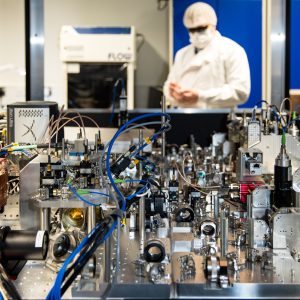
British quantum computing company Orca is working with Nvidia on speeding up and improving the machine learning process. A new hybrid system sends some of the processing off to the quantum processor, which the company says improves the output quality and speeds up the training time.

The partnership comes at a time when there are concerns over a bottleneck in compute power for training new large language and foundation AI models. The larger the models become, and the more complex the output, the more intense the compute demands.
Under the hybrid system a combination hybrid classical and quantum algorithm can be split between Nvidia GPUs which are traditionally used in machine learning, and newer quantum processing units (QPUs) from Orca. William Clements, head of machine learning at Orca Computing told Tech Monitor: “It is good to think of the QPU as something that helps the GPU in the learning process”.
Orca has been focusing on image generation and analysis techniques with its quantum machine learning. This is the type of AI model that powers tools like Stable Diffusion and Midjourney. Aside from creating images from a text prompt, the models also allow for the creation of synthetic images for use in medicine, or looking for changes in environmental factors across a large image library.
“What we are doing in generative modelling is trying to see how [QPU performance] scales and how it impacts the performance of generative algorithms,” Clements says. “We’re really quite excited about this hybrid approach. It really allows us to scale to a quite large system. We’ve already performed demonstrations involving a quantum processor and, and a GPU cluster.”
He said they have demonstrated the ability to generate very high quality images using the combination of a photonic QPU and eight large GPUs. They found it was both faster and an improvement over the GPU cluster operating alone. “It is there to help the classical system learn to approximate a distribution. In the case of images, it’s a distribution of pixels. What the GPU does is provide an initial rich distribution that you wouldn’t have any other way of producing,” explained Clements.
This effectively means the QPU works out the best placement of each individual pixel being generated by the GPUs, tells the GPU where to place those pixels and then hands off so the GPU can do its work in generating a higher quality image without having to worry about the positioning and layout.
This technique could prove invaluable in other areas where a large number of small items needs to be placed in the most efficient way, for example in the placement of transistors on a chip.
Quantum machine learning could solve compute bottlenecl
“Machine learning has made amazing strides in the last few years,” Clements says. “But some issues are still there. For example it’s massively hungry in terms of data and computational resources. And the second thing is it’s really good at certain types of data sets, like text, but it’s not necessarily quite as good for scientific data sets, molecules, and things like that.
“Where quantum computing comes in is that quantum computers are able to solve certain types of mathematical problems that classical computers cannot solve.”
Nvidia has been focusing on creating a bridge between classical and quantum through its open source CUDA Quantum toolkit and quantum simulation tools that run on high-powered GPUs.
While companies like Orca are still striving to develop pure quantum computers, where the hardware is both powerful enough and reliable enough to help businesses, this is potentially decades away. In the meantime, classical computers are required to pick up the slack, and a hybrid model presents a viable and faster path to a degree of commercial quantum advantage.
Orca has been leveraging this hybrid solution in generative adversarial network (GAN) types of machine learning. In a classical GAN, two neural networks are trained to compete against each other. One is a generator that converts random numbers from a probability distribution known as the “latent space” into data such as images. The other is a discriminator that has to try and decide if the data is real or fake.
In the hybrid system the “latent space” is provided by the photonic quantum computer, taking it away from the GPUs generating and evaluating the images. “The quality of the data produced by the generator strongly depends on the type of latent space that is used,” Orca says. “Using a quantum latent space improves a GAN’s performance on some datasets such as those used in quantum chemistry.”
Orca’s PT-Series photonic quantum processor acted as a latent space during experiments, with eight Nvidia A100 GPUs trained the classical neural networks that acted as the generator and discriminator. All machines were on-site.
“Hybrid quantum-classical computing has the potential to reshape the way industry leaders collaborate to solve some of the world’s toughest challenges,” said Timothy Costa, director of high performance computing and quantum at Nvidia. “CUDA Quantum enables Orca’s PT-Series photonic quantum processor to seamlessly develop and integrate hybrid workflows, unlocking a new age of quantum computing and making it more accessible to researchers than ever.”






